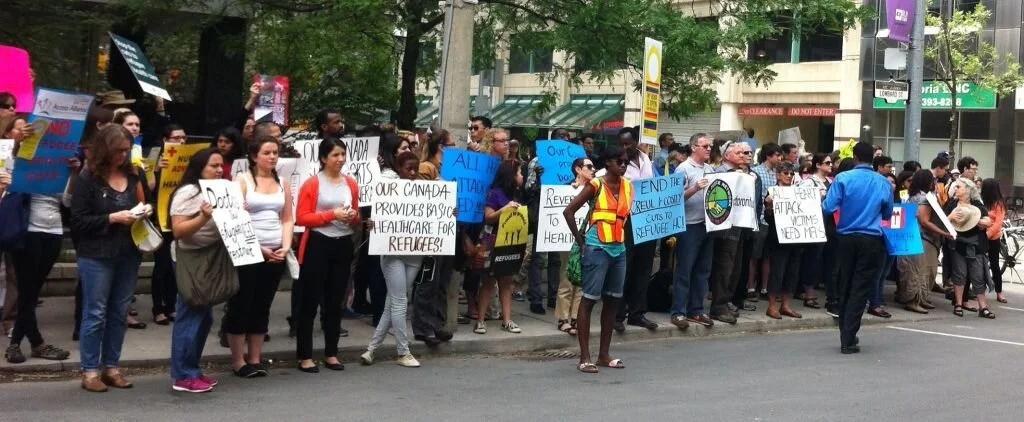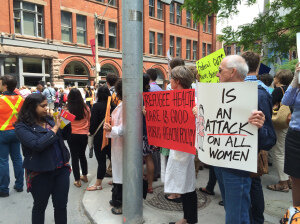A Doctor’s Plea For His Patients: An Interview with the Organizer of the National Day of Action
Protesters at the National Day of Action by Abtin Parnia
Protesters at the National Day of Action by Kevin Lahm
On June 30, 2012, the Canadian government implemented cuts to the Interim Federal Health Program (IFH) for refugees. With these changes to the IFH, Canadian refugees no longer had access to medication coverage, vision and dental care. They were only covered for issues of public health concern. In July 2014, the Federal Court ruled that Ottawa’s cuts were “cruel and unusual” treatment because they intentionally targeted vulnerable children and adults.
“The 2012 modifications to the Interim Federal Health Program potentially jeopardize the health, the safety and indeed the very lives, of these innocent and vulnerable children in a manner that shocks the conscience and outrages our standards of decency”
After the ruling was released, Immigration Minister Chris Alexander announced that the government would appeal the ruling. The court refused this appeal, and November 4, 2014 remained the deadline set by the Supreme Court to reverse the cuts. The Canadian government was forced to resume providing health care to refugee claimants, however the resulting health care access is more limited in scope.
We interviewed Dr. Hasan Sheikh, just after the Supreme Court’s first ruling. Dr. Sheikh is an active member of Canadian Doctors for Refugee Rights and is one of the organizers for the National Day of Action, an annual event that globally protests against the IFH cuts. Dr. Sheikh is a family medicine resident at the University of Toronto and practices at St. Michael’s Hospital.
Were there any personal experiences with your patients that served as an impetus for your involvement?
Sheikh: As part of my family medicine residency, I had a few patients who were refugee claimants. I saw the chaos that happened around the cuts and how difficult it was to connect people to resources. It was even difficult to figure out myself what coverage someone had or did not have. A lot of times this was much harder than medical decisions. There were some patients I had already started to see, who had Interim Federal Health (IFH) coverage prior to the cuts, and suddenly had no coverage for the medications that were very essential to their health. A patient of mine, who was very stable on anti-depressants and had previous suicide attempts, came in saying he could not afford anti-depressants, as they were no longer covered. We were very concerned with his mental health going forward. On other rotations, such as being in the emergency room, I saw the mass confusion that surrounded patient health coverage.
Other than health providers, a lot of the opposition to these cuts has come from students. Why do you think students in particular are drawn to this issue?
Sheikh: I think the academic world occupies a very interesting and unique place on this issue. When you are in a learning environment, you work very closely with other people. The academia is a place where ideas are shared and discussed. There is this mentality of sharing ideas, exploring information, and questioning to reach fundamental truths. I have seen a lot of discussions in the academic world on whether these cuts make sense, what is the evidence for and against them. I think that is why students are so engaged on this issue.
As one of the organizers of the National Day of Action, would you tell us about your role and the organization process?
Sheikh: For the past two years, our goal was to continue to make the cuts an issue. I think it is easy for people to slide the issue back into their consciousness and become jaded by the desire to push. We wanted to make that push, to keep highlighting the cases, anecdotes and the importance of fixing these cuts. We started by finding contacts from key cities, planning times and putting together press releases and packages for people to use. Last year we tried to extend this campaign to an international campaign. We used the posters from the National Day of Action to reach to people from all across the world and encourage them to take a picture at a prominent landmark with the poster. We wanted to show the Minister of Citizenship and Immigration Canada at the Prime Minister office that this is not just a local issue. This issue is one that affects Canada’s reputation.
What were some challenges the organization faced for the National Day of Action?
Sheikh: I think the biggest challenge is to continuously get people engaged. This, at least, is what we foresaw as the biggest challenge. As time goes on and inertia kicks in, people are less likely to come out for something they perceive had no change. Recently, the federal court stated that these cuts were against the Charter of Rights and Freedom. This was another huge victory for us and continuously motivates people to be engaged.
How can undergraduate students like ourselves be more engaged in advocating for refugee rights and healthcare?
Sheikh: The very first step is to become educated on the topic. There are so many things you can explore when it comes to this topic. I have been really impressed by a number of undergraduate students who have said to me “we honestly don’t know much about this and want to learn more”. I have also spoke at a couple of health policy courses at U of T about these cuts. Beyond educating yourself, there is a lot you can do in the advocacy world, from campaigning on social media sites to calling your MP. However, it is most important to become politically involved. It is so easy to become apathetic, but political engagement is what makes this society tick.
Since the federal court ruled in favour of the Canada Doctors for Refugee Care, what do you think are the next steps for the organization?
Sheikh: The impact of that court ruling is still unclear. The government has said that they will appeal the ruling. However, it is still unclear whether or not the court will reverse the cuts prior to the appeal. We could be looking at a long time before a court mandate changes the program. It requires us to continue to push the issue through the media, direct action and political statements. While this is tied up in the courts and political bureaucracy, people’s lives are still affected. Unfortunately, next year we are looking at the fourth year in protesting these cuts. These protests now coincide with an upcoming election. Thus, I think it’s very important for us to maintain momentum and push hard for people to understand this issue and keep their candidates’ feet to the fire.
This interview has been edited for clarity and brevity.
Read Dr. Sheikh’s letter to Chris Alexander on the Huffington Post here: http://www.huffingtonpost.ca/dr-hasan-sheikh/refugee-healthcare_b_4951002.html?utm_hp_ref=tw


